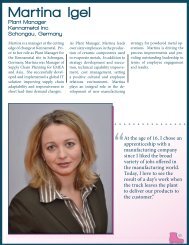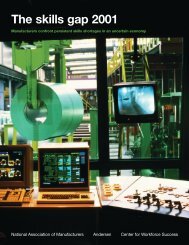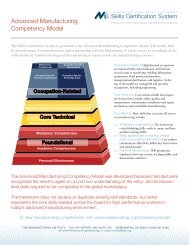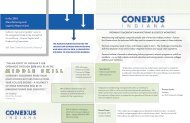2005 Skills Gap Report - Manufacturing Institute
2005 Skills Gap Report - Manufacturing Institute
2005 Skills Gap Report - Manufacturing Institute
You also want an ePaper? Increase the reach of your titles
YUMPU automatically turns print PDFs into web optimized ePapers that Google loves.
<strong>2005</strong> <strong>Skills</strong> <strong>Gap</strong> <strong>Report</strong><br />
The methods employers reported for maximizing employee commitment<br />
showed a strong awareness of what employees value, including<br />
high response rates for front-line supervisory skills, management/<br />
leadership skills, proper training, tools, support, communications,<br />
and other skills that are required for lean manufacturing environments.<br />
Compensation was identified as a moderate driver, which<br />
indicates a healthy perspective that employee commitment is not just<br />
about money. Low responses to several areas offer further opportunities<br />
for improving employee commitment, including providing challenging<br />
work, advancement opportunities, quality of jobs, incentives,<br />
performance reviews, selection criteria, and formal and informal<br />
networks. As employers seek to increase engagement and commitment<br />
toward developing a high-performance workforce, these<br />
opportunities will be critical.<br />
<br />
<br />
<br />
<br />
<br />
<br />
<br />
<br />
<br />
<br />
<br />
<br />
<br />
<br />
<br />
<br />
<br />
<br />
<br />
<br />
<br />
<br />
<br />
<br />
<br />
<br />
<br />
Competitive Wages and Benefits<br />
As noted above, respondents do not see compensation and benefits<br />
as their best way to maximize employee commitment. Certainly, these<br />
dollars are important in the employee/employer equation, but the reality<br />
is that employees quickly take compensation and benefits as a given and<br />
look to other aspects of a company’s value proposition in making decisions<br />
about joining or staying and how much effort to put forth.<br />
The key message for U.S. manufacturers is that competitive wages<br />
and benefits are important in attracting and retaining employees, but<br />
these are just the starting points for developing a differentiated value<br />
proposition for employees. People want more from their work experience<br />
than a paycheck. They want transferable skills and experiences<br />
that make them valuable to their current employer as well as to the<br />
broader market. This comes in the form of challenging work assignments,<br />
training and development, advancement and promotion, and<br />
rotational assignments. Employees also want respect, recognition,<br />
and connection in the workplace, specifically relevant performance<br />
management processes and incentives (monetary and non-monetary),<br />
formal and informal networks, formal and informal mentoring, and a<br />
general sense of community within the workplace.<br />
Training<br />
<strong>Manufacturing</strong> employers surveyed see training as a business<br />
necessity to be delivered just-in-time, and not as a way to attract<br />
employees, as noted above in the section on recruiting strategies.<br />
Respondents noted moderate value for training as a retention tool.<br />
At the same time respondents reported that their spending on<br />
training is increasing – and not just for executives, but across all<br />
employee groups. Employers are placing emphasis on specific job<br />
skills in offering training to their employees.<br />
13







